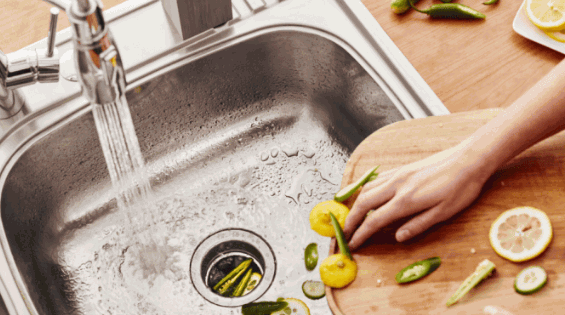Table of Contents
A clogged kitchen drain can be a major inconvenience, causing water to back up and potentially leading to foul odors. In this article, we will explore the importance of keeping your kitchen drain clean and the common causes of clogs, such as grease and oil buildup, food scraps, soap scum, and mineral deposits. We will also provide practical tips on how to prevent clogs and natural ways to clean your drain. We will discuss when it’s time to call a professional plumber for persistent clogs, foul smells, slow drainage, gurgling noises, or multiple clogged drains. Let’s dive in and learn how to maintain a clean and functional kitchen drain!
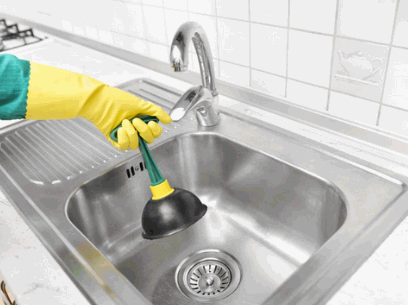
Why Is It Important To Keep Kitchen Drain Clean?
Maintaining a clean kitchen drain is crucial for the overall hygiene and functionality of your kitchen. A clean drain ensures proper water flow and prevents blockages that can lead to plumbing issues and unpleasant odours.
Avoiding grease build-up in the drain is essential as it can accumulate over time, causing blockages and hindering the drainage process. Regular drain maintenance not only prevents blockages but also prolongs the lifespan of your plumbing system by reducing the chances of corrosion and leaks. By investing time and effort into caring for your kitchen drain, you are ensuring that your kitchen remains a clean and healthy environment for food preparation and cooking.
Explore: How Much Does Unblocking A Drain Cost
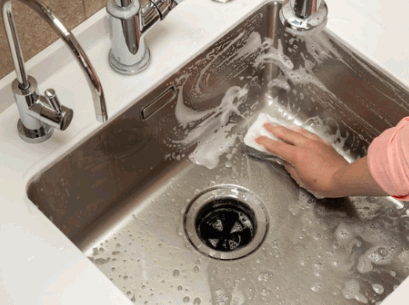
What Causes Kitchen Drains To Get Clogged?
Several factors contribute to blockages in kitchen drains, ranging from grease and oil build-up to food scraps and soap scum. Understanding these common causes can help in implementing preventative measures and maintaining a blockage-free kitchen drain.
Grease and oil are notorious for their ability to solidify and cling to the insides of pipes, leading to blockages over time. When washed down the drain, these substances gradually accumulate, reducing the drainage capacity and causing slow water flow.
Food scraps like coffee grounds, pasta, and rice can further worsen blockages by forming clumps and obstructing the smooth flow of water. Soap scum, resulting from the combination of soap and minerals in the water, can also form stubborn deposits that contribute to drain blockages.
Grease And Oil Buildup
One of the primary culprits behind kitchen drain blockages is the build-up of grease and oil from cooking. When poured down the sink, these substances solidify and adhere to the pipe walls, reducing the space for water to flow.
Over time, this grease accumulation can result in severe obstructions, leading to water backup and potentially causing unpleasant smells coming from the plughole. To prevent such problems, it is crucial to implement regular maintenance procedures.
Preventative measures such as refraining from pouring cooking oils directly into the sink and ensuring food leftovers are adequately disposed of can greatly help keep your pipes free from blockages. Introducing regular pipe cleansing techniques using natural remedies like a mixture of bicarbonate of soda and vinegar can assist in breaking down grease build-ups and maintaining unobstructed passage in your drains.
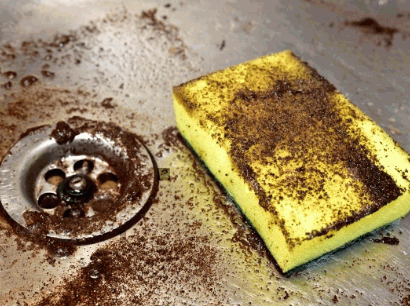
Food Scraps
Food scraps that are washed down the kitchen sink can accumulate over time and contribute to drain blockages. Items like coffee grounds, vegetable peelings, and pasta can create obstructions and impede the flow of water.
When these food scraps mix with grease or oil, they can form a stubborn, greasy residue that sticks to the inner walls of the drain pipes, further narrowing the passage for water to flow smoothly. This mixture becomes a breeding ground for bacteria and unpleasant smells, making the kitchen environment less than ideal.
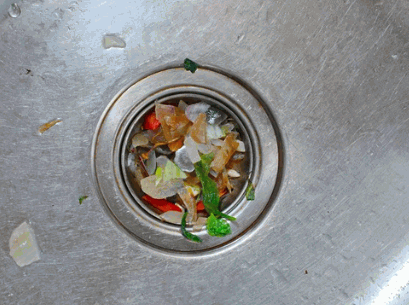
Soap Scum
Soap scum, a residue formed by soap mixing with minerals in water, is another common cause of kitchen drain blockages. This sticky substance can accumulate inside pipes, attracting other debris and causing obstructions.
This combination of soap and minerals creates a stubborn film on the inner walls of the pipes, reducing the water flow and eventually leading to drainage problems. Over time, if not dealt with, soap scum can harden, forming a resilient barrier that is difficult to eliminate. To avoid the build-up of soap scum, it’s crucial to regularly clean and maintain kitchen drains. One effective technique is to utilise vinegar and bicarbonate of soda as a natural cleaning solution to break down the scum and keep the pipes unobstructed.
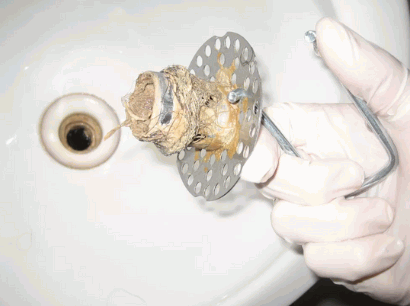
Mineral Deposits
Mineral deposits from hard water can accumulate in kitchen drains, contributing to blockages over time. These deposits can solidify, reducing the diameter of the pipe and obstructing the flow of water.
When left unattended, these blockages can lead to blockages, slow drainage, unpleasant smells, and even pipe corrosion. To prevent these problems, it’s crucial to invest in regular cleaning and maintenance of kitchen drains.
One effective solution is using a mixture of vinegar and bicarbonate of soda to dissolve mineral buildup. Installing a water softener can help reduce the hardness of the water flowing through your pipes, minimising the formation of deposits.
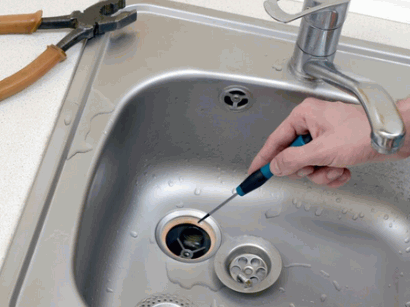
How To Prevent Kitchen Drains From Getting Clogged?
Preventing kitchen drain blockages requires implementing simple yet effective practices that can help maintain a clear and functioning drainage system. By following preventative tips, you can avoid the inconvenience of dealing with blocked pipes.
Proper waste disposal is crucial in preventing drain blockages; ensure food scraps are scraped into the bin rather than washed down the sink. Regularly clean your drain using a mixture of vinegar and bicarbonate of soda to break down any grease build-up. Installing drain strainers is a proactive measure to trap debris like hair before it causes obstructions. Opt for natural solutions over harsh chemicals for a safer and eco-friendly approach to maintaining clean kitchen drains.
Dispose Of Grease And Oil Properly
Properly disposing of grease and oil after cooking is essential to prevent kitchen drain blockages. Instead of pouring them down the sink, collect them in a container and dispose of them in the bin.
When grease and oil are poured down the sink, they can solidify and build up in the pipes, causing blockages and potential plumbing problems. It’s crucial to adopt:
- alternative methods of disposal
- such as using absorbent materials like kitchen rolls to wipe excess grease before washing dishes
- cooling the oil, transferring it into a sealed container, and then throwing it away
Regularly cleaning your kitchen surfaces and utensils from grease residues can also greatly contribute to preventing blockages. By taking these simple yet effective steps, you can avoid costly repairs and keep your drains free-flowing.
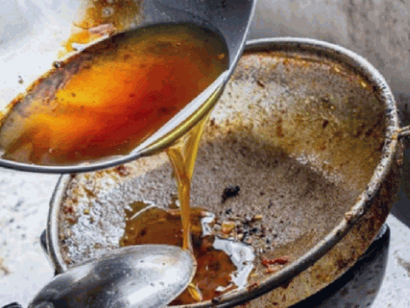
Use A Sink Strainer
Fitting a sink strainer in your kitchen sink can help trap food particles and debris, preventing them from entering the drain and causing blockages. This simple tool is effective in maintaining a blockage-free drain.
Not only does a sink strainer prevent major blockages, but it also saves you from dealing with unpleasant odors that can result from stagnant water and leftover food residue in your drains. By regularly cleaning out the strainer, you can easily dispose of trapped waste, keeping your drains clear and flowing smoothly. There are various types of sink strainers available, including mesh, perforated, and basket styles, each offering unique advantages depending on your needs. Opting for a strainer with a handle for easy removal and cleaning can simplify the maintenance process.
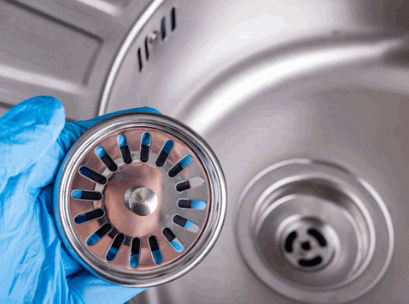
Avoid Putting Food Scraps Down The Drain
To prevent kitchen drain blockages, it is crucial to avoid putting food scraps, coffee grounds, and other solid waste down the sink. Proper waste disposal can significantly reduce the risk of blockages.
When food scraps, such as vegetable peelings, fruit skins, and eggshells, go down the sink, they can accumulate over time, leading to unpleasant blockages and odors. Coffee grounds are another common culprit, as they clump together and can create blockages in pipes. Grease and oils are particularly harmful as they solidify and coat the drain pipes, causing severe blockages.
Regular maintenance and adopting alternative disposal methods can make a world of difference in preserving the health and longevity of your drains.
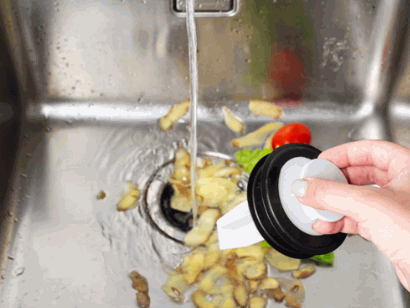
Regularly Clean The Drain
Regularly cleaning your kitchen drain using natural solutions like bicarbonate of soda and vinegar can help prevent blockages and maintain optimal drainage. Scheduled maintenance can keep your drain system running smoothly.
By incorporating routine pipe cleaning practices into your household chores, you ensure that debris and buildup are flushed away regularly, reducing the chances of a stubborn blockage.
Using preventative measures with natural drain solutions not only keeps your drains clear but also helps to avoid the strong chemicals found in commercial cleaners.
For effective cleaning, start by pouring a kettle of boiling water down the drain to loosen any greasy residues. Then, follow up with a mixture of bicarbonate of soda and vinegar to break down organic matter and eliminate odors.
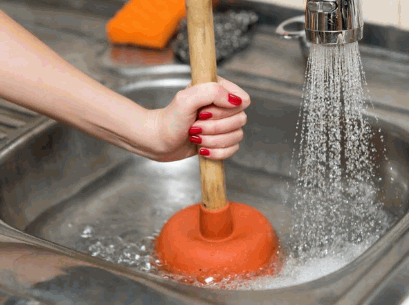
What Are Some Natural Ways To Clean Kitchen Drains?
Cleaning kitchen drains using natural solutions is a safe and eco-friendly way to maintain a clog-free drainage system. Ingredients like bicarbonate of soda, vinegar, and lemon can effectively remove buildup and odour from drains.
One popular DIY drain cleaner involves pouring a mixture of half a cup of bicarbonate of soda followed by one cup of vinegar down the drain. This combination creates a fizzing reaction that helps break down debris and sanitise the pipes. Regularly performing this simple maintenance routine can prevent major clogs and the need for harsh chemical cleaners. By opting for eco-friendly solutions, you not only protect the environment but also ensure a healthier home for you and your family.
Baking Soda And Vinegar
A mixture of bicarbonate of soda and vinegar can create a foaming reaction that helps break down grease and organic matter in kitchen drains. This natural solution is effective in clearing minor blockages and maintaining drain health.
To use this method, start by pouring boiling water down the drain to help loosen any build-up. Next, pour about a 1/2 cup of bicarbonate of soda into the drain, followed by an equal amount of vinegar. Be cautious, as the mixture will bubble and fizz as it reacts. Let it sit for about 30 minutes to an hour to allow the solution to work its magic.
- Once the time is up, rinse the drain with hot water to flush out the loosened debris and complete the reaction.
- For ongoing maintenance, repeat this process once a month to prevent future blockages with this environmentally friendly option.
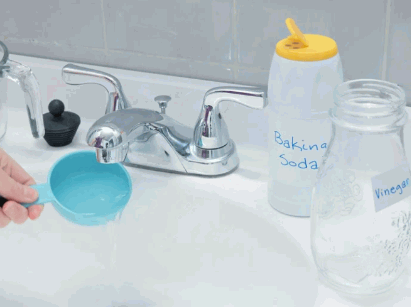
Boiling Water And Salt
A mixture of boiling water and salt can be poured down kitchen drains to dissolve grease and mineral buildup. This simple and cost-effective method can help prevent clogs and maintain clear drainage.
When boiling water is combined with salt, the heat helps to melt away the stubborn debris, while the salt’s abrasive quality aids in scrubbing away residues clinging to the pipes. This method is not only efficient at clearing out existing clogs but also serves as a preventive measure to keep the drains running smoothly.
- Using boiling water and salt is eco-friendly and does not involve harsh chemicals that could potentially damage the pipes or harm the environment.
- To ensure safety during this process, it is essential to handle boiling water with caution to avoid burns, and always wear protective gear such as gloves and goggles.
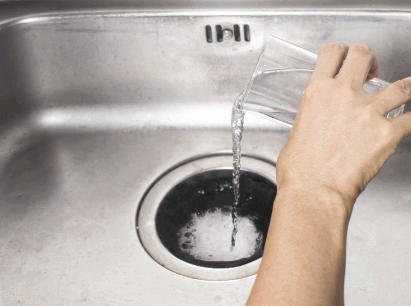
Lemon And Salt
A mixture of lemon juice and salt can act as a natural cleanser for kitchen drains, helping to remove grease and odors. This refreshing solution can be used regularly to maintain a fresh-smelling drain.
When using this mixture, it’s important to squeeze fresh lemon juice and sprinkle a sufficient amount of salt down the drain.
- The acid in lemon juice helps break down buildup while the coarse salt acts as a gentle abrasive, aiding in cleaning.
- This powerful combination not only cleans but also helps prevent blockages, keeping your drain running smoothly.
Plus its cleaning properties, lemon and salt also work as a deodorizer, leaving a pleasant citrus scent in your kitchen. To maximise the effect, let the mixture sit in the drain for about an hour before flushing with hot water.
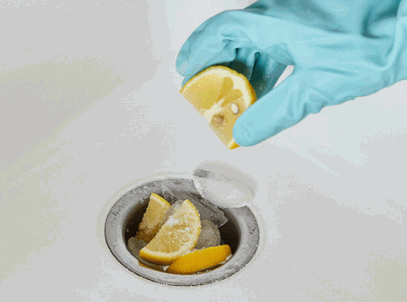
When Should You Call A Professional Plumber?
Certain signs indicate the need to call a professional plumber to address kitchen drain issues. From persistent blockages and unpleasant odours to sluggish drainage and gurgling noises, recognising these symptoms can help prevent extensive plumbing problems.
If you notice water collecting around the kitchen sink or find that your sink is taking longer than normal to drain, these are clear indicators of potential plumbing issues. Another common warning sign is when using a drain cleaner fails to clear the blockage or if you consistently hear unusual gurgling noises coming from your pipes. Ignoring these early signals can lead to costly repairs in the future, emphasising the importance of seeking help from a certified plumbing expert promptly.
Persistent Clogs
Persistent blockages that recur despite DIY efforts may require the expertise of a professional plumber. These stubborn blockages can indicate underlying issues within the drainage system that need professional assessment and resolution.
Attempting to tackle severe blockages on your own with basic tools or enzymatic drain cleaners may provide temporary relief, but for long-term effectiveness, consulting a skilled plumber is essential. Plumbers have the necessary tools, knowledge, and experience to diagnose complex plumbing issues accurately and provide lasting solutions. Ignoring persistent clogs can lead to more significant issues like pipe damage or sewer backups, underscoring the importance of addressing these drainage issues promptly.
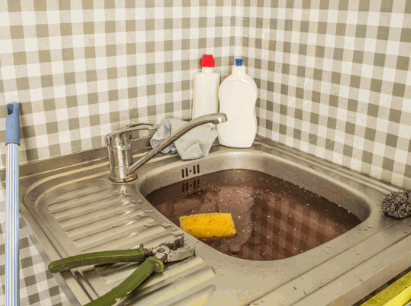
Foul Smells
Unpleasant odours emanating from kitchen drains can be a sign of bacterial growth or decaying matter in the pipes. Contacting a plumber to investigate and remedy the source of these smells is essential for maintaining a healthy drainage system.
When drain smells start wafting through your kitchen, it can indicate a potential buildup of food debris, grease, or soap scum in the drain pipes. Keeping your drains clean by regularly flushing them with hot water or a mixture of baking soda and vinegar can help prevent these odours from occurring. Inspecting and cleaning drain traps can also play a vital role in eliminating foul smells. If the odours persist despite your efforts, it’s best to seek assistance from professional plumbers who have the expertise and tools to tackle complex drainage issues.
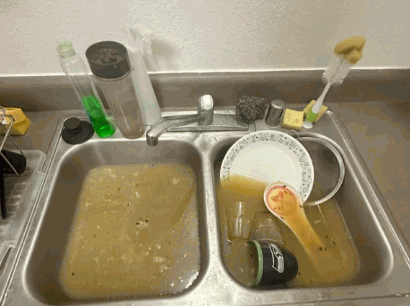
Slow Drainage
Slow drainage in kitchen sinks can indicate partial clogs or blockages in the drain pipes. Seeking assistance from a professional plumber can help diagnose the root cause of the slow flow and implement effective solutions.
When water takes longer than usual to empty from the sink, it could be a sign of debris buildup, grease accumulation, or even mineral deposits obstructing the passage. These issues can disrupt the smooth flow of water and cause inconvenience in daily kitchen activities.
The accumulation of food particles and soap scum over time can gradually restrict the drainage capacity, leading to persistent slow drainage issues. This not only affects the functionality of the sink but can also result in unpleasant odours and potential hygiene concerns.
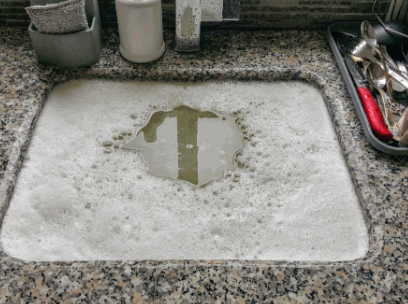
Gurgling Noises
Gurgling noises coming from kitchen drains often indicate air trapped in the pipes or improper ventilation. Consulting a professional plumber can help identify the source of these sounds and address any underlying plumbing issues.
These sounds can be more than just a nuisance; they could signal potentially serious drain issues that require prompt attention. Common culprits for such disturbances include blockages, pipe obstructions, or even faulty installations affecting the water flow. Neglecting these peculiar noises could lead to more significant plumbing problems down the line, such as leaks or blockages. Expert plumbers possess the expertise and tools necessary to diagnose and resolve these issues efficiently, ensuring the long-term functionality of your kitchen drainage system.
Multiple Clogged Drains
Experiencing blockages in multiple drains simultaneously indicates a more extensive issue within the plumbing system that may require professional intervention. Calling a plumber to assess the situation can prevent further damage and ensure comprehensive repairs.
When blockages occur in several drains at once, it’s often a sign of a larger problem lurking in the drain system. These issues can extend beyond just a simple blocked pipe to potential obstructions in the main drain line. Without proper evaluation, these blockages can persist and potentially worsen over time.
By enlisting the expertise of a qualified plumber, you can uncover the root cause of these widespread blockages. Factors such as tree roots invading the pipes, built-up debris, or even structural issues may be contributing to the drain system issues.
